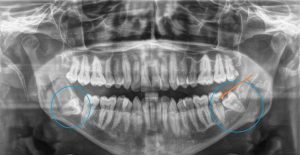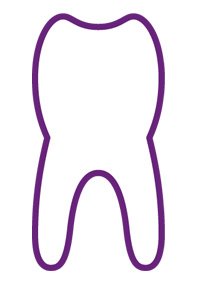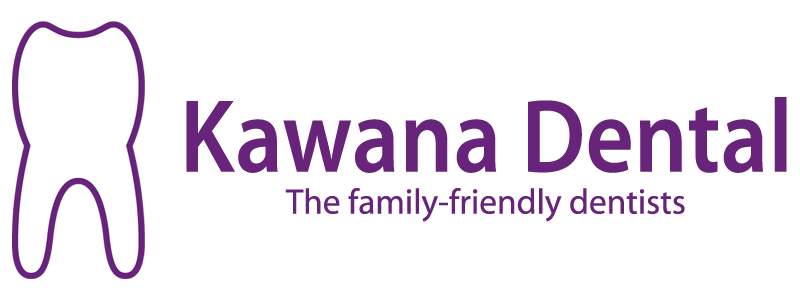08 Apr How does wisdom teeth removal work?
Having your wisdom teeth removed is a process that begins with an initial consultation followed by a procedure and recovery time that differs from person to person.
How does the process work?
The process of having your wisdom teeth removed can be split into three stages: the initial consultation, the procedure itself and recovery.
1. Before Wisdom Teeth Are Removed
At Kawana Dental, before we begin any wisdom tooth removal procedure, we set up an initial consultation and take X-rays to assess the scope of the surgery. Generally an OPG x-ray is required, and sometimes an additional 3D scan is taken if required. These scans allow us to determine the potential difficulty, the approach to be taken and any particular risks associated with your condition. As part of the consultation, we will ensure that you understand the work that we will be doing, and why it is necessary, and will discuss options like sedation or general anaesthesia.
2. A General Overview of the Procedure
Step 1 – Application of numbing anaesthetic before the procedure begins. If sedation or general anaesthetic is taking place, this happens in this period also.
Step 2 – If the tooth is partially or fully impacted the dentist will create a small incision to expose the tooth and its socket.
Step 3 – For wisdom teeth that are obstructed by the jawbone, some of the bone around the tooth is removed with a surgical instrument.
Step 4 – The tooth is then extracted. This may be done in sections if it will make the removal easier.
Step 5 – Gauze is applied to pack the wound, and stitches are used to close the incisions.
3. Recovery After the Procedure
Mouth activity is likely to be limited for at least a day after the procedure, and pain may last a week. There may be swelling or some bruising.
Ensuring that the wounds remain clean and free from infection requires a cautious, considered approach as you think about what will help and what could hinder the healing process.
For at least a week following the removal you will need to avoid any food or activity that could put stress or pressure on the wounds. We recommend avoiding alcohol, caffeine and smoking for at least 48 hours as well as eating only soft foods for a while.
For more info, see Tooth extraction after care
By carefully following our directions and guidance pre- and post-surgery, you will have the best chance of allowing the operation to go smoothly and enjoying quicker healing.
If I’m having one wisdom tooth removed, should I just get them all removed at once?
This is a decision that needs to be made on a case by case basis. Any surgical procedure can be unpleasant, and the recovery period can take upwards of a week. For these reasons, as well as the cost benefits, it may be the best decision to remove all of your wisdom teeth at the same time, particularly if the procedure is being done with sedation or general anaesthetic.
It may be more convenient as there is a single recovery period, you only have to pay for one administration of anaesthetic, and you don’t have to worry about having to go for the procedure again at a later date. Surgeries that remove multiple teeth have a similar recovery time to those that involve a single tooth.
Should I have my wisdom tooth extracted?
If you’re wondering if wisdom teeth removal is the best option for you, there are three questions to ask yourself:
- Is there enough space for the tooth to properly erupt?
If there is not enough space for the wisdom tooth to fully erupt the gum tissue and cells around the wisdom tooth may become inflamed and irritated. This leads to swelling in the area, pain and may cause problems with chewing and swallowing.
- Are you at risk of disease?
Impacted wisdom teeth have potential to lead to the formation of fluid-filled cysts in the jawbone. They expand slowing destroying bone tissue. In instances like this, the wisdom tooth will need to be removed.
- Are other teeth at risk?
Sometimes impacted wisdom teeth can cause issues with other teeth, such as food impaction, decay or resorption.
What are the signs that it’s time to have my wisdom teeth removed?
There are a number of early warning signs that shouldn’t be ignored. They can help prevent a more costly and expensive surgery. Symptoms include:
- Gums around the wisdom teeth that are red, swollen or bleeding
- A sore or swollen jaw
- Bad breath
- A strange taste in your mouth that you can’t get rid of
- Difficulty opening your mouth
What will happen if I don’t have my wisdoms removed?
Wisdom teeth removal isn’t required for everyone. In some cases, wisdom teeth grow straight and do not cause pain or infection, or remain buried and remain problem free. But problematic wisdom teeth, if left untreated, can cause serious issues including infection, damage to the bone, cysts and damage to adjacent teeth.



